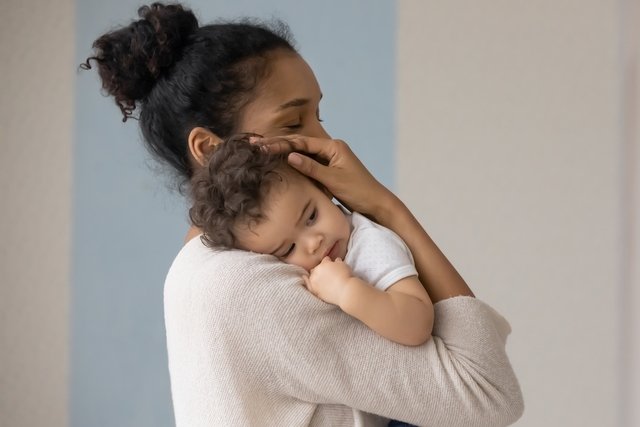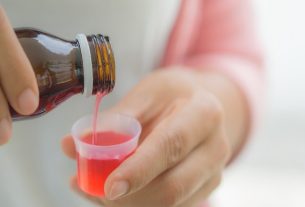Coughing is a very common symptom in babies and occurs as a defense mechanism of the body to try to expel some food or secretions. Furthermore, a baby’s cough can occur in cases of a cold, bronchitis, asthma or rhinitis, for example.
One of the ways to relieve your baby’s cough is to have him stand on your lap or sit, so that his head is elevated, as this position helps the baby breathe better. Another way to reduce coughing is to offer small amounts of water to reduce throat irritation.
However, if the baby has a fever, difficulty breathing or coughs accompanied by vomiting, it is important to take the baby to the pediatrician, who will carry out a complete assessment and may recommend the use of some medications, such as antibiotics and antiallergics.
Main causes of cough in babies
Coughing in babies is usually the body’s defense mechanism to eliminate secretions in cases of simple respiratory problems, such as the flu or cold, which are characterized by the presence of clear mucus or phlegm, a blocked nose and difficulty breathing.
Furthermore, a baby’s cough can be caused by strong smells, such as cigarette smoke, fresh paint or insecticide, asthma, reflux, or by infections, such as laryngitis, rhinitis, bronchiolitis, pneumonia or whooping cough. In addition to infections, another cause of coughing in babies is choking, which can be caused by the presence of an object or food in the child’s throat.
What to do
Some home measures that can help relieve your baby’s cough are:
- Offer small amounts of water throughout the day, if the baby is over 6 months old, breastfeed on demand or give the baby formula at room temperature to reduce throat irritation. Liquids should only be offered when the cough is under control, to avoid choking;
- Rinse the baby’s nose with saline solution, when the nose is blocked too, as this helps to clear the nose, relieving coughs. See how to wash your nose;
- Nebulize with saline solutionwith a nebulizer, to clean and hydrate the airways, reducing irritation and preventing coughing.
- Give your baby a warm bath with the bathroom door closedto produce steam in the environment, helping to hydrate the airways;
- Use a humidifierif you feel that the air in the house is drier;
- Place a pillow or folded towels under the mattress to raise the head of the crib a little because this way the airways are free and the reflux decreases, reducing the baby’s coughing.
In the case of babies over 2 years old, it is possible to give 1 teaspoon, or 2.5 mL of honey, before bed, as honey helps to hydrate the throat and relieve coughs, in addition to having antimicrobial and antiviral properties. and anti-inflammatory.
Pharmacy remedies
The use of medication is recommended by the pediatrician when the cough is caused by more complicated situations, such as rhinitis, pneumonia or asthma. Therefore, the pediatrician may prescribe some pharmaceutical medicines, such as antiallergics, antibiotics, decongestants or expectorants, where the time of use and dosage of the medicine varies according to the age, the baby’s general health and the cause of the cough.
When to take your baby to the pediatrician
It is recommended to take your baby to the pediatrician, especially if he is less than 6 months old, if he has any heart or lung disease and/or presents any of the following symptoms:
- Cough for more than 5 days;
- If the cough is dry and especially at night;
- Fever of 38ºC or more;
- Baby’s breathing faster than normal;
- Difficulty breathing, with bluish skin and lips;
- Noise or wheezing when breathing;
- Lots of phlegm or bloody phlegm;
- Coughs with vomiting.
It is important that, when consulting with the pediatrician, parents or guardians inform all the symptoms, when they started and everything that was done to try to relieve the baby’s cough.
Taking care of your health has never been easier!
Bibliography
- GOLDMAN Ran. Honey for treatment of cough in children. Canadian Family Physician. 60. 1107-1110, 2014
- QASIM Mohamed. The therapeutic role of honey for treating acute cough in the pediatric population. A systematic review. Journal of Pediatric and Neonatal Individualized Medicine. 2. 8; 1-6, 2019
- SHIELDS, D, Michael; DOHERTY, M, Gary. Chronic cough in children. Paediatric Respiratory Reviews . Vol.14. 2.ed; 100-105, 2013
- YANG, Michele; SO, Tsz-Yin. Revisiting the Safety of Over-the-Counter Cough and Cold Medications in the Pediatric Population. Clinical Pediatrics. Vol.53. 4.ed; 326-330, 2014
- BRAZILIAN SOCIETY OF PEDIATRICS. Cough. Available at: <https://www.sbp.com.br/especiais/pediatria-para-familias/cuidados-com-a-saude/tosse/#:~:text=A%20tosse%20protege%20as%20vias, symptom%20present%20in%20v%C3%A1rias%20pathologies>. Accessed on October 25, 2021
- MARTINS, Susana et al. Cough in pediatrics. Portuguese Journal of Pulmonology. Vol.14. 4.ed; 517-526, 2008
- PORTUGUESE SOCIETY OF PEDIATRICS. Common illnesses and other problems: cough. Available at: <http://criancaefamilia.spp.pt/doencas-comuns-e-outros-problemas/tosse.aspx>. Accessed on October 25, 2021

Sign up for our newsletter and stay up to date with exclusive news
that can transform your routine!
Warning: Undefined array key "title" in /home/storelat/public_html/wp-content/plugins/link-whisper-premium/templates/frontend/related-posts.php on line 12
Warning: Undefined array key "title_tag" in /home/storelat/public_html/wp-content/plugins/link-whisper-premium/templates/frontend/related-posts.php on line 13




